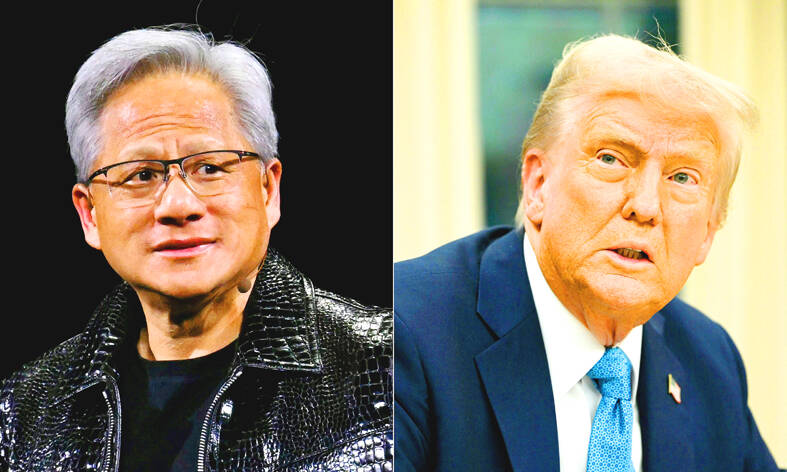Jensen Huang (黃仁勳), CEO of artificial intelligence (AI) chip giant Nvidia Corp, met on Friday with US President Donald Trump as the company suffered a rough week on Wall Street over competition with China and the threat of tariffs on semiconductors.
Trump said he would put tariffs on imports of computer chips to the US, which would punish Nvidia’s business that depends on imported components, mainly from Taiwan.
“It was a good meeting, but eventually we’re going to put tariffs on chips,” Trump told reporters afterward.

Photo: AFP
High-end versions of Nvidia’s chips face US export restrictions to the major market of China, part of Washington’s efforts to slow its Asian adversary’s advancement in the strategic technology.
That policy came under scrutiny this week when Chinese start-up DeepSeek achieved widespread adoption of its latest AI model that was developed without access to Nvidia’s export-blocked H100 chips.
After the DeepSeek breakthrough, US media reported the Trump administration was exploring ways to expand the restrictions to Nvidia’s lower-end chips.
The DeepSeek model triggered a plunge in Nvidia’s stock on Monday, wiping out nearly US$600 billion in market value — Wall Street’s largest single-day loss ever.
“We appreciated the opportunity to meet with President Trump and discuss semiconductors and AI policy,” an Nvidia spokesperson said. “Jensen and the president discussed the importance of strengthening US technology and AI leadership.”

Taiwan Semiconductor Manufacturing Co (TSMC, 台積電) would not produce its most advanced technologies in the US next year, Minister of Economic Affairs J.W. Kuo (郭智輝) said yesterday. Kuo made the comment during an appearance at the legislature, hours after the chipmaker announced that it would invest an additional US$100 billion to expand its manufacturing operations in the US. Asked by Taiwan People’s Party Legislator-at-large Chang Chi-kai (張啟楷) if TSMC would allow its most advanced technologies, the yet-to-be-released 2-nanometer and 1.6-nanometer processes, to go to the US in the near term, Kuo denied it. TSMC recently opened its first US factory, which produces 4-nanometer

PROTECTION: The investigation, which takes aim at exporters such as Canada, Germany and Brazil, came days after Trump unveiled tariff hikes on steel and aluminum products US President Donald Trump on Saturday ordered a probe into potential tariffs on lumber imports — a move threatening to stoke trade tensions — while also pushing for a domestic supply boost. Trump signed an executive order instructing US Secretary of Commerce Howard Lutnick to begin an investigation “to determine the effects on the national security of imports of timber, lumber and their derivative products.” The study might result in new tariffs being imposed, which would pile on top of existing levies. The investigation takes aim at exporters like Canada, Germany and Brazil, with White House officials earlier accusing these economies of

Teleperformance SE, the largest call-center operator in the world, is rolling out an artificial intelligence (AI) system that softens English-speaking Indian workers’ accents in real time in a move the company claims would make them more understandable. The technology, called accent translation, coupled with background noise cancelation, is being deployed in call centers in India, where workers provide customer support to some of Teleperformance’s international clients. The company provides outsourced customer support and content moderation to global companies including Apple Inc, ByteDance Ltd’s (字節跳動) TikTok and Samsung Electronics Co Ltd. “When you have an Indian agent on the line, sometimes it’s hard

PROBE CONTINUES: Those accused falsely represented that the chips would not be transferred to a person other than the authorized end users, court papers said Singapore charged three men with fraud in a case local media have linked to the movement of Nvidia’s advanced chips from the city-state to Chinese artificial intelligence (AI) firm DeepSeek (深度求索). The US is investigating if DeepSeek, the Chinese company whose AI model’s performance rocked the tech world in January, has been using US chips that are not allowed to be shipped to China, Reuters reported earlier. The Singapore case is part of a broader police investigation of 22 individuals and companies suspected of false representation, amid concerns that organized AI chip smuggling to China has been tracked out of nations such